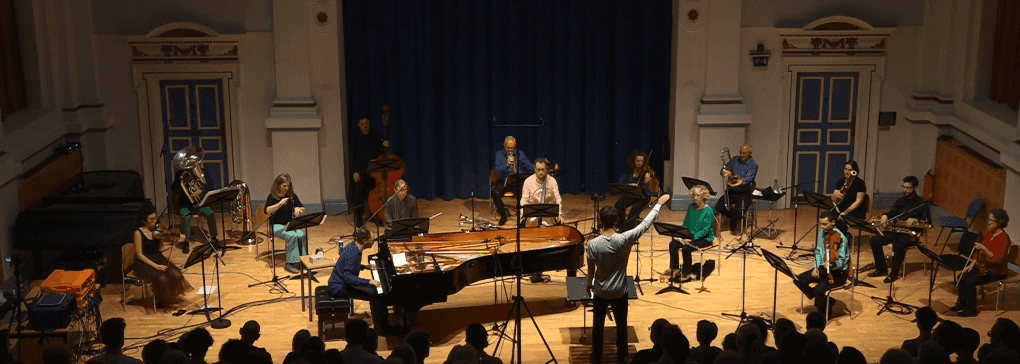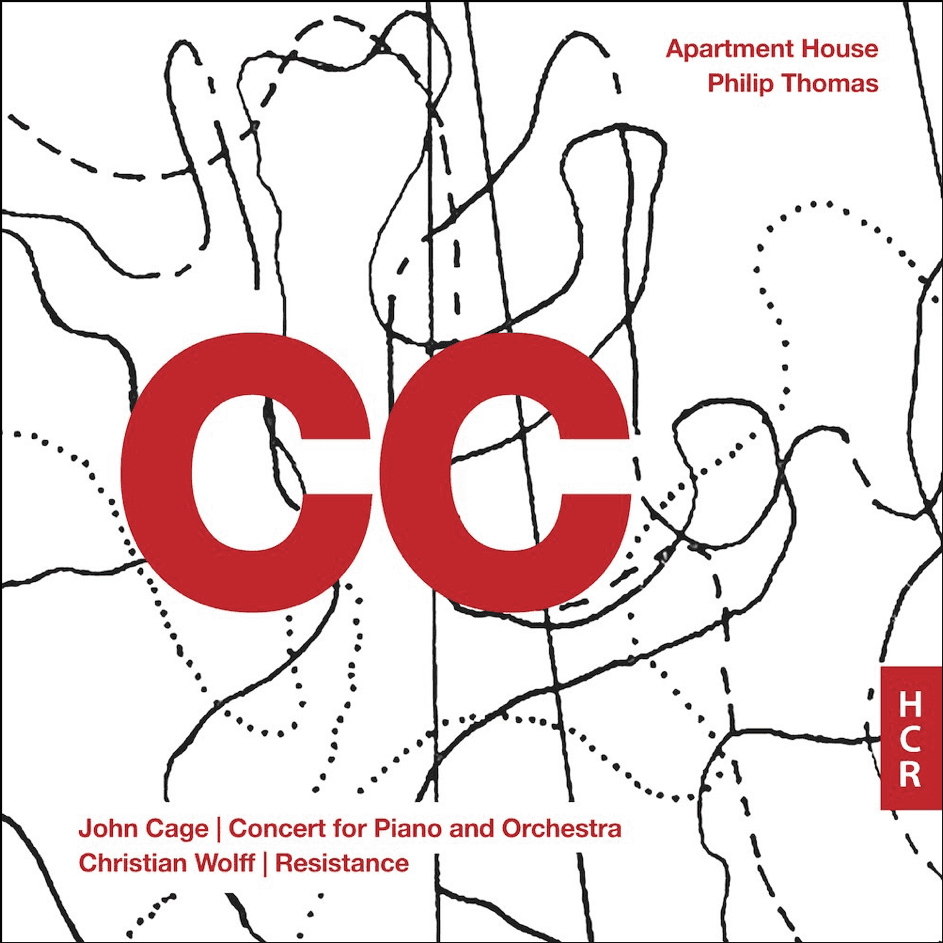Outputs and activities
Book

The project resulted in a monograph, John Cage and the Concert for Piano and Orchestra, co-authored by Martin Iddon and Philip Thomas. The book is published by Oxford University Press as part of the series, Studies in Musical Genesis, Structure, and Interpretation (Series Editor: Malcolm Gillies).
From the publisher's website:
"John Cage's Concert for Piano and Orchestra is one of the seminal works of the second half of the twentieth century, and the centerpiece of the middle period of Cage's output. It is a culmination of Cage's work up to that point, incorporating notation techniques he had spent the past decade developing - techniques which remain radical to this day. But despite Cage's vitality to the musical development of the twentieth century, and the Concert's centrality to his career, the work is still rarely performed and even more rarely examined in detail.
"In this volume, Martin Iddon and Philip Thomas provide a rich and critical examination of this enormously significant piece, tracing its many contexts and influences - particularly Schoenberg, jazz, and Cage's own compositional practice - through a wide and previously untapped range of archival sources. Iddon and Thomas explain the Concert through a reading of its many histories, especially in performance - from the legendary performer disobedience and audience disorder of its 1958 New York premiere to a no less disastrous European premiere later the same year. They also highlight the importance of the piano soloist who premiered the piece, David Tudor, and its use alongside choreographer Merce Cunningham's Antic Meet. A careful examination of an apparently bewildering piece, the book explores the critical response to the Concert's performances, re-interrogates the mythology surrounding it, and finally turns to the music itself, in all its component parts, to see what it truly asks of performers and listeners."
Performances
A major project output was a performance of John Cage’s Concert for Piano and Orchestra (1957–58) and the world premiere of Christian Wolff’s Resistance (2017) by Apartment House in Clothworkers Centenary Concert Hall, School of Music, University of Leeds, on 1 July 2017. Watch the film of the Concert for Piano and Orchestra here and Resistance here. Apartment House gave a second performance of the Concert at St. John at Hackney, London on 5 July 2017. The Resistance commission was funded by the Ernst von Siemens Music Foundation and the Hinrichsen Foundation.
Reviewing the Leeds concert for Tempo, Oliver Thurley commented: ‘Apartment House’s devoted work on Cage’s Concert for Piano and Orchestra is sure to become an authoritative interpretation of the work alongside the original 25-year Retrospective Concert recording almost 60 years after the famous Tudor/Cunningham premiere.’
The London concert was reviewed by Ben Harper, who wrote that Apartment House’s performance ‘opened up a new way of hearing this music. […] I’ve never heard a more powerful performance of the piece, live or on record.’ Writing in The Wire, Igor Toronyi-Lalic, editor of The Spectator’s Culture House and Culture House Daily blog, described the concert as the ‘best gig by miles’ of 2017 (The Wire, January 2018).
Recordings
The performance in Leeds was recorded and released on the Huddersfield Contemporary Records (NMC) label. The recording has had international impact and has received attention from numerous high-profile music critics and journalists. Kate Molleson (Guardian, 26 October 2017) gave it a four-star review, commenting, ‘[t]rust is the making of indeterminate music and Apartment House’s new recording is all trust. Philip Thomas makes the piano part magnetic, like the centrifugal planet in an erratic constellation.’ Alex Ross, music critic of The New Yorker, listed it as one of his ‘Releases of Interest’ (The Rest is Noise, 17 January 2018) and Tim Rutherford-Johnson recommended it as one of his ‘2017: Sounds of the Year’, stating that ‘Thomas’s dedication to realising this work, on recording and in a concert from the University of Leeds […] is to be applauded’ (The Rambler, 31 December 2017). Reviewing the CD for Classical-Modern Review, Grego Applegate Edwards described it as ‘one of the very finest, rivaling the 1972 recording by Ensemble Negativa released in Germany as part of the now quite obscure LP set Music Before Revolution. […] It is a superb reading. […] The Cage is a masterpiece of its time and Apartment House do it benchmark justice’ (14 December 2017). Brian Olewnick also reviewed it positively, noting the ‘excellent accompanying pair of essays by Martin Iddon and Philip Thomas’, and praising the performance’s ‘specificity […] that seems quite unique and immediate’, concluding simply, ‘[f]ine work’ (Just Outside, 4 December 2017). In his positive review of the recording for Gramophone magazine (Issue 4, March 2018), Liam Cagney commented: ‘Philip Thomas and Apartment House, out of what could simply be a flat plane, render a vibrant surface with all the activity of a Jackson Pollock. Thomas’s touch is nuanced and various, a steady centre around which the ensemble’s ephemeral voices appear.’ Writing in American Record Guide (July/August 2018), Rob Haskins commented: ‘This new performance is in all ways a revelation and an achievement of the highest order. […] From now on, when I teach this piece, I’ll use this recording and am looking forward to studying it more thoroughly. […] I would advise obtaining this disc.’
Other publications
The project conference, Performing Indeterminacy, resulted in a collection of essays, Performing Indeterminacy: Experimental Music in Practice, co-edited by Martin Iddon, Emily Payne, and Philip Thomas. The book is currently in preparation.
Emily Payne, ‘Time Management in Indeterminacy: The Conductor as “Chronometer” in John Cage’s Concert for Piano and Orchestra’, Oxford Handbook of Time in Music, eds. Mark Doffman, Emily Payne, and Toby Young (New York, NY: Oxford University Press, under contract)
Philip Thomas, ‘Performing John Cage’s Solo for Piano’, The Sampler (February 2017)
Conference presentations and seminars
In chronological order. All presentations are team-authored unless otherwise indicated.
‘Documentary and Digital Approaches to Performing John Cage’s Concert for Piano and Orchestra’, Performance Studies Network Fifth International Conference, Norwegian Academy of Music (5–8 July 2018)
Emily Payne, ‘Time Management’ in Indeterminacy: The Conductor as “Chronometer” in John Cage’s Concert for Piano and Orchestra’, Oxford Conducting Institute International Conducting Studies Conference, University of Oxford (21–23 June 2018)
Christopher Melen and Philip Thomas, ‘Encoding Indeterminacy’, Music Encoding Conference, University of Maryland (22–25 May 2018)
‘“… A Solo or a Part in an Ensemble, Symphony, or Concerto”: Documenting Performer Perspectives on John Cage’s Concert for Piano and Orchestra’, Tracking the Creative Process in Music Conference, University of Huddersfield (14–16 September 2017)
Emily Payne, ‘Performing Cage’s Concert for Piano and Orchestra: a creative conundrum?’, Royal Musical Association Annual Conference, Guildhall School of Music & Drama, London (3–5 September 2016)
Special session: ‘Performing at the limits: John Cage’s Solo for Piano‘, Performance Studies Network 4th International Conference, Bath Spa University (14–17 July 2016)
Christopher Melen and Philip Thomas, ‘Performing at the limits: John Cage’s Solo for Piano’, Huddersfield Centre for Performance Research Study Day, University of Huddersfield (27 June 2016)
Invited talks
Emily Payne, ‘Against Togetherness in Performance? A Case Study of John Cage’s _Concert for Piano and Orchestr_a’, University of York Music Department Research Seminar Series (3 June 2020)
Emily Payne, ‘Ensemble Dynamics in Indeterminate Music: A Case Study of John Cage’s _Concert for Piano and Orchestr_a’, University of Cambridge, Faculty of Music Colloquia (13 November 2019)
Emily Payne, ‘“Time Management” in Indeterminacy: The Conductor as “Chronometer” in John Cage’s Concert for Piano and Orchestra’, Utrecht Colloquia in the Musicologies, Utrecht, Netherlands (9 May 2019)
Martin Iddon, ‘On Radicality and (Non-)Representation in John Cage’s Solo for Piano’, Arnold Schoenberg Centre, Vienna, Austria (5 April 2019)
Philip Thomas, ‘Agitating the Discipline: Performing Cage’s Concert for Piano and Orchestra’, University of Nottingham, (19 March 2019)
Emily Payne and Philip Thomas, ‘John Cage’s Concert for Piano and Orchestra’, Ecole des Hautes Etudes en Sciences Sociales (Paris) (21 March 2018)
Martin Iddon, ‘Things to Make and Do’, Performance-Cage-Philosophy Panel, RMA Music and Philosophy Study Group’s Biennial Conference, King’s College London (13–14 July 2017)
Martin Iddon and Philip Thomas, ‘Framing Freedom: Distributed Authority in Cage’s Concert for Piano and Orchestra’, American Experimentalism Study Day, Royal Academy of Music (28 February 2017)
Martin Iddon, Emily Payne, and Philip Thomas, ‘Performing at the limits: John Cage’s Solo for Piano’, Bienen School of Music, Northwestern University (22 September 2016)
Related items
Books
Martin Iddon, (ed.), John Cage and Peter Yates: Correspondence on Music Criticism and Aesthetics (Cambridge: Cambridge University Press, 2019)
Martin Iddon, John Cage and David Tudor: Correspondence on Interpretation and Performance (Cambridge: Cambridge University Press, 2013)
Martin Iddon, New Music at Darmstadt: Nono, Stockhausen, Cage, and Boulez (Cambridge: Cambridge University Press, 2013)
Articles
Philip Thomas, ‘Understanding Indeterminate Music through Performance: Cage's Solo for Piano’, twentieth-century music, vol. 10, no. 1 (2013): 91–113.


